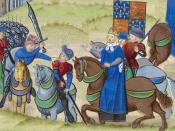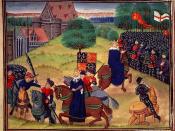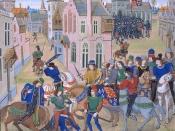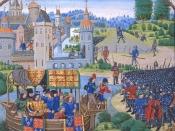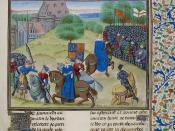Results of Peasant's Revolt in 1381 Not many American's know about the English Peasant's Revolt in 1381, maybe because it happened along time ago in London or maybe because it is looked down upon greatly by the government and they are trying not to acknowledge it. Basically, The Peasants' Revolt took place in June 1381. An army of peasants from Kent and Essex marched on London. They did something no-one had done before or since - they captured the Tower of London. The Archbishop of Canterbury and the King's Treasurer were killed. The king, Richard II, was only 14 at the time but despite his youth, he agreed to meet the peasants at a place called Mile End to discuss the situation and work out any problems the Peasants had (Lindsay, Groves 19).
A lot of people ask what the reason for such a great revolt was. Well here is why first of all, After the Black Death, many manors were left short of workers.
To encourage those who had survived to stay on their manor, many lords had given the peasants on their estates their freedom and paid them to work on their land. Now, nearly 35 years after the Black Death, many peasants feared that the lords would take back these privileges and they were prepared to fight for them (Britannia Internet Magazine. 1997. ). Secondly, Many peasants had to work for free on church land, sometimes up to two days in the week. This meant that they could not work on their own land, which made it difficult to grow enough food for their families. Peasants wanted to be free of this burden that made the church rich but them poor. They were supported in what they wanted by a priest called John Ball from Kent ( Tyler, Wat. 2000. Columbia University Press. 22 March 2000. ). Last of all, because there had been a long war with France. Wars cost money and that money usually came from the peasants through the taxes that they paid. In 1380, Richard II introduced a new tax called the Poll Tax. This made everyone who was on the tax register pay 5p. It was the third time in four years that such a tax had been used. By 1381, the peasants had had enough. 5p to them was a great deal of money. If they could not pay in cash, they could pay in kind, such as seeds, tools etc., anything that could be vital to survival in the coming year.
By the summer of 1381, the revolt was over. John Ball was hanged. Richard did not keep any of his promises claiming that they were made under threat and were therefore not valid in law. Other leaders from both Kent and Essex were hanged. The poll tax was withdrawn but the peasants were forced back into their old way of life - under the control of the lord of the manor (Britannia Internet Magazine. 1997. ).
However, the lords did not have it their own way. The Black Death had caused a shortage of labor and over the next 100 years many peasants found that they could earn more (by their standards) as the lords needed a harvest in and the only people who could do it were the peasants. They asked for more money and the lords had to give them more (Tyler, Wat. 2000. Columbia University Press. 22 March 2000. ).
Who won this terrible fight is still undecided because on the surface, the rebellion seems like a failure, and in fact, the immediate results were negative. The serfs and the workmen were in a worse position: manorial services were more severe, and the commutation of labor services for money payments slowed. However, the 1381 Peasants' Revolt made men more aware, aware of their market value as laborers, and the importance of community. Economic development itself aided the abolition of serfdom with the growth of towns, commerce, and industry. The rebels did not win but they did not lose (Lindsay, Groves 163).


